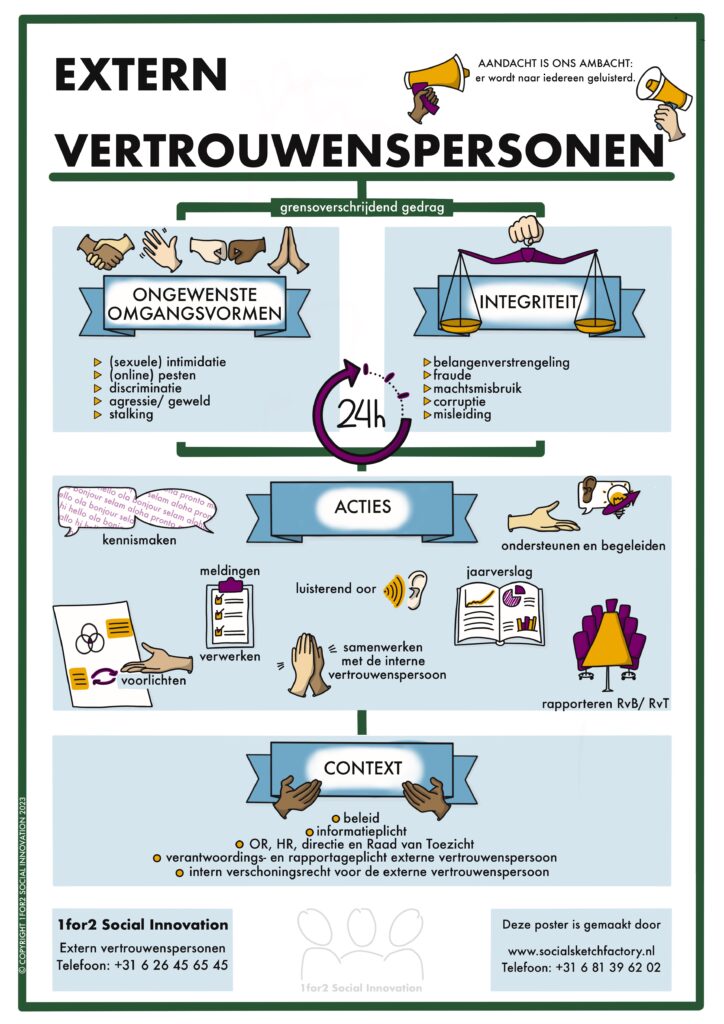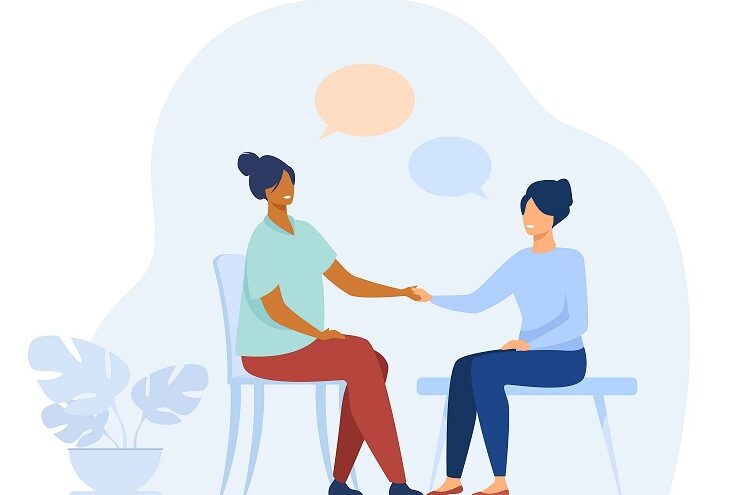INTERNAL OR EXTERNAL?
In the latest issue of Dentista, the professional magazine for the dental world (dentists/orthodontists), this article, to which we contributed, was recently published.
Lately, there has been increasing attention to unwanted behavior in the workplace. However, this attention has not yet led to a decrease in such behavior. As a result, the need for a confidential counselor within organizations is growing, although it is not yet legally regulated. This might soon change from The Hague, where legislation in this area is being developed. But what exactly is a confidential counselor? What’s the difference between internal and external, and what does it mean for the dental practice?
Over a million people experience unwanted behavior at work. This includes undesirable social interactions and integrity issues. Unwanted social interactions are: bullying, (sexual) harassment, discrimination, and aggression. Integrity issues involve (among others) fraud, corruption, and abuse of power. The common goal is to reduce this unwanted behavior in the workplace.

Legislation is being developed that will require employers to appoint a confidential counselor, to reduce unwanted behavior in the workplace and create a safe working environment for all employees. The proposal also allows for the appointment of an external person as a confidential counselor. This can be especially beneficial for smaller organizations that cannot or do not wish to handle this internally. Furthermore, the legislative proposal outlines the basic tasks of the confidential counselor and strengthens their legal position within organizations.
There is a chance that employers will be required to appoint an internal or external confidential counselor, including in dental practices. We asked Kirsten Heukels, who has been active as an external confidential counselor since 2018, about the role of confidential counselors within organizations.
What Does a Confidential Counselor Do?
A confidential counselor is there for employees who want to discuss certain issues in confidence, for example, if they have reports or complaints about unwanted behavior. The confidential counselor supports the employee, listens, looks at what they want, searches for solutions, and guides or refers them to support services. A confidential counselor also advises and supports employers and managers in preventing unwanted social interactions. In short, a confidential counselor listens, guides, and advises. Practices can choose between an internal or external confidential counselor.”
What’s the Difference Between Internal and External?
Internal confidential counselors work within the practice itself and are colleagues. External confidential counselors are not employed within the organization. They are independent outsiders. Well-trained professionals, who know how to deal with people who come to them with complaints and what paths can be taken in different situations. In some cases, the reporter may prefer not to discuss the concern within the company; then an external confidential counselor is appreciated.
In other cases, an internal confidential counselor is nice because they are close and can think along based on their own experience in the organization.
Comparing the two doesn’t do justice to either, but if only one option is possible, choose an external confidential counselor. They have the most knowledge and expertise, are independent, and are familiar with confidentiality. It’s common that people find it unpleasant and complicated to approach a colleague with a complaint about another colleague. Then an external confidential counselor is nice! If possible, use both internal and external and have them work well together. Then you have the best of both worlds combined.
How Do You Approach This Within a Practice?
Where people work together, conflicts can arise over social interactions and unwanted behavior. Especially where colleagues work as closely together as in dentistry. Yet, you see that in many places, no confidential counselor has been appointed. And I understand that. It’s hard to find the right people within your organization, but also outside it. There are many parties offering confidential counselors, but how do you separate the wheat from the chaff? That’s difficult.
However, what I recommend to everyone is to start thinking about it now. Of course, with the upcoming legislation in mind, but also to arrange it properly for your own practice.
There is quite a lot involved in shaping this: making policies, ensuring that people understand them, knowing what they can and cannot do, and following up and handling reports. It’s important and nice to have all that arranged when calamities occur, then employees at least know who they can contact.
Provide Training for Internal Confidential Counselor
“For internal confidential counselors, it is important to clearly define the task and role description. Through adequate training, they can perform their duties well and confidentially, thereby enhancing the quality and professionalism within the organization. Make a conscious choice for a well-trained internal confidential counselor so that they are optimally able to fulfill this role successfully. In this way, you as an organization not only show care for the well-being of your employees, but you also demonstrate to supervisory bodies, including the Dutch Labor Inspectorate, that you have organized things correctly.

Ensure Training for Internal Confidential Counselors
For internal confidential counselors, it’s crucial to define their tasks and roles clearly. Through proper training, they can perform their duties well and confidentially, thus enhancing the quality and professionalism within the organization. Choose a well-trained internal confidential counselor deliberately, so they are optimally equipped to fulfill this role successfully. In this way, your organization not only shows care for the well-being of your employees but also demonstrates to supervisory bodies, including the Dutch Labor Inspectorate, that you have organized things correctly.
Kirsten Heukels is an independent entrepreneur and owner of 1for2 Social Innovation. She is internationally active as a profiler, analyzing the combination of micro-expressions in the face, body language, and voice use. She applies these skills in her work as a crisis and hostage negotiator. Additionally, she coaches individuals and teams to achieve excellent communication and, thereby, collaboration. Among others, she serves as an external confidential counselor for organizations like the KNVB, Odin, and Embraer.
Extern: 1 for 2 Social Innovation, heeft speciaal voor kleinere organisaties, een specifiek abonnement gemaakt voor een externe vertrouwenspersoon. Bel gerust voor meer informatie en tips, naar 06-26 456 545
